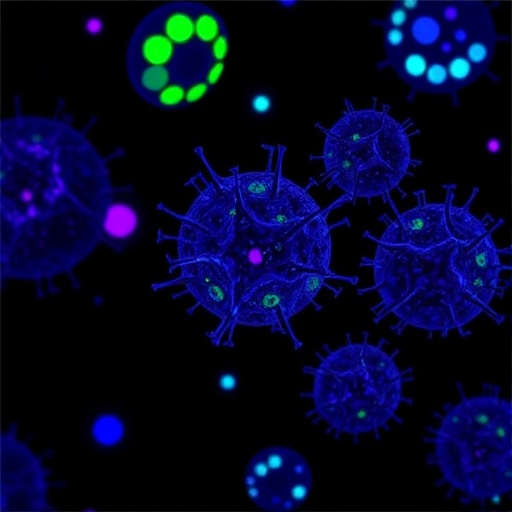Recent advancements in medical research have unveiled critical insights into the complexities of systemic lupus erythematosus (SLE), a multifaceted autoimmune disorder that predominantly affects women. In a groundbreaking study led by researchers Soares, Wemans, and Caldas, published in Biology of Sex Differences, a detailed analysis of X-linked transcriptome dysregulation across immune cells was conducted. This study aims to elucidate the fundamental mechanisms driving the pathological processes associated with SLE, leveraging cutting-edge transcriptomics to provide unprecedented clarity on the sex-specific variations observed in this disease.
As autoimmune diseases like SLE show a stark preference for affecting women, the role of sex chromosomes presents a crucial point of inquiry. The X chromosome holds a wealth of genes implicated in immune response and regulation, presenting an intriguing avenue for exploration. The research team undertook a systematic investigation to assess how these X-linked genes are expressed in different immune cell types, further illuminating the underlying factors that may contribute to the high prevalence of SLE in females.
One of the significant features of this research is its focus on transcriptomic analysis, which allows for a fine-grained evaluation of gene expression patterns across various immune cell populations. By utilizing advanced sequencing technologies, the researchers quantified the RNA transcripts present in immune cells isolated from individuals diagnosed with SLE. This precise measurement of gene activity provides invaluable insights into how cellular functions may be altered in the context of autoimmune pathology.
The results of the study revealed noteworthy abnormalities in the expression of several X-linked genes within the immune cells of SLE patients. These dysregulated transcripts were linked to critical immune functions such as antigen presentation and cytokine signaling, both of which are essential for proper immune system operation. Understanding these changes is pivotal for developing potential therapeutic strategies that could more effectively target the underlying causes of SLE.
Additionally, the study underscored the potential role of epigenetic modifications as a contributing factor to the observed transcriptome dysregulation. Epigenetics refers to the chemical modifications on DNA and histones that influence gene expression without altering the underlying genetic code. Such modifications can be influenced by environmental factors, hormonal fluctuations, and other biological processes, suggesting that SLE may be partly driven by a complex interplay between genetic predispositions and external triggers.
Another salient aspect of the research was its focus on the heterogeneous nature of SLE, as not all patients exhibit the same symptoms or severity of disease. The expression profiles of the X-linked genes provided a more nuanced understanding of how immunological variations manifest amongst patients. This knowledge is crucial not only for refining diagnostic criteria but also for tailoring individualized treatment plans based on specific genetic and transcriptomic backgrounds.
Moreover, the implications of this study extend beyond theoretical knowledge; the findings can pave the way for novel therapeutic approaches aimed at rectifying the dysregulated pathways identified in SLE. By targeting specific pathways linked to the X-linked genes, future therapies could be developed that offer more personalized and effective interventions for those affected by this debilitating condition.
The exploration of sex-linked genetic factors is not merely an academic endeavor; it has significant implications for public health and clinical practice. As awareness grows regarding the sex disparity seen in autoimmune diseases, healthcare providers may need to reconsider diagnostic and treatment paradigms that have historically been based on predominantly male populations.
In light of these revelations, it is clear that the study conducted by Soares and colleagues represents a pivotal moment in lupus research. By illuminating the complexities of the X-linked transcriptome in immune cells, the research serves as a critical stepping stone toward addressing the urgent needs of SLE patients, particularly women. The road ahead will undoubtedly be shaped by these findings, as researchers continue to explore the intricacies of sex differences in immune responses and the associated consequences for disease progression and management.
Ultimately, the innovative approach taken by the research team not only sheds light on the biological basis of systemic lupus erythematosus but also highlights the importance of interdisciplinary collaboration in unraveling complex medical mysteries. Moving forward, sustained focus on the interplay between sex, genetics, and immune responses will be vital in advancing our understanding of autoimmune diseases and improving outcomes for affected individuals.
With ongoing research and technological advancements, the prospects for unraveling the mysteries of systemic lupus erythematosus continue to grow. As we gain a deeper understanding of how X-linked transcriptome dysregulation influences immune cell function, the potential for eliciting transformative changes in the diagnosis and treatment of this disease becomes increasingly tangible. The insights from this study are set to incite further research endeavors aimed at innovating and perfecting therapeutic interventions tailored particularly for women affected by SLE.
In conclusion, the study shines a light on the critical importance of integrating genomic and transcriptomic insights into the broader framework of autoimmune disease research. By focusing on sex-linked factors, researchers are on the precipice of unlocking new avenues for treatment and prevention that could potentially save lives and enhance the quality of life for countless individuals battling with systemic lupus erythematosus.
Subject of Research: Systemic lupus erythematosus and X-linked transcriptome dysregulation
Article Title: X-linked transcriptome dysregulation across immune cells in systemic lupus erythematosus
Article References:
Soares, M., Wemans, I.S., Caldas, P. et al. X-linked transcriptome dysregulation across immune cells in systemic lupus erythematosus.
Biol Sex Differ 16, 69 (2025). https://doi.org/10.1186/s13293-025-00750-3
Image Credits: AI Generated
DOI: 10.1186/s13293-025-00750-3
Keywords: systemic lupus erythematosus, X-linked genes, transcriptomics, autoimmunity, immune response, epigenetics, precision medicine, sex differences, genetic factors




